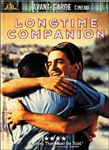

 |
Longtime
Companion
|
 |
|
Ladymol's Review This film should be compulsory. Itís described on the box as remarkable and for once they arenít exaggerating. Told with remarkably natural acting, this is the story of a group of men from the early 80s to the 90s, from before AIDS had a name until it had decimated the group. It begins with a weekend on Fire Island, where the beaches were swarming with beautiful men out to have a good time and ends with three survivors walking through the empty sand, lamenting what has passed. Itís never maudlin; it doesnít pull its punches; it doesnít assign blame or make moralistic statements. It just shows the devastating affects of AIDS on peopleís lives, how it tore lovers apart, ruined the lives of those who survived. The hideous symptoms of AIDS, in all its different forms, are poignantly shown. I was particularly moved by the writer who develops Alzheimer and whose lover coaches him during calls with the studio bosses to keep up the fiction that heís well. His long drawn out death is agonising to watch. The cover of the box shows two men embracing. You have to watch the film to get whatís actually happening here. When you do, I defy you not to cry. Itís amazing watching this piece of history. The guys sit avidly watching a soap because thereís about to be the first gay kiss ever shown on TV. Weíve come a long way. If you are the least interested in gay issues then make a point of watching this film.† Cerisaye's Review This film took me by surprise.† I suppose I expected something like Terms of Endearment or Love Story, a real weepie, emotionally manipulative and over the top mawkishness.† Well I was wrong.† The story begins and ends on beautiful gay paradise Fire Island.† It avoids melodrama and sentimentality.† Yes I cried, but I laughed more and was moved by real feelings for characters brought to life by the actors.† It isnít a film about death and dying.† Itís about living with a deadly virus that taints everything it touches yet somehow getting through the dark times with love and compassion and affection. Beginning in 1981 we follow a group of friends and lovers, from the first story to report a disease affecting gay men to1989, when carefree sex was unimaginable, something that might kill not a celebration of freedom and identity.† They didnít know what was about to hit them that summer the New York Times reported the emergence of a new cancer in the gay community.† The party was over.† The film aims at a mainstream audience, to educate about AIDS and its impact on gay life, and to show weíre all the same regardless of sexual preference.† Terminal illness is hard on the dying but those who love and care for them take the strain whether the disease is cancer or AIDS.† Thereís almost no sex to threaten straight viewers but a whole lot of loving intimacy that surely persuades anyone open-minded enough to watch that gay relationships arenít just about anonymous casual encounters.† The men are successful and well adjusted, businessmen, writers, actors, and lawyers, with an easy, affluent lifestyle in New York City.† Theyíre sympathetic characters, good-looking guys who could mostly pass for straight rather than in-your-face gay boys or outrageous queens.† I thought it was going to be a death watch.† Like war movies where you try to spot those who'll make it through.† I expected to find out whoíd been sleeping with who and tricking on the side.† However itís not like that.† Opening scenes of beautiful buff bodies enjoying the freedom of Fire Island are followed by hospital visits, problems with discrimination, paranoia and fear.† But itís nicely underplayed: silent shots of hospital rooms filled with AIDS patients, the visiting friend who scrubs his hands & face after a kiss, the first gay characters appearing on daytime soaps.† Because it covers several years and concentrates on issues about AIDS there isnít time to fully develop all characters.† So we get snapshots rather than detailed portraits.† The most fully realised relationship is between two older men, Sean & David.† A lover becomes a nurse, changing the nappy of his dying partner, and when the time comes telling him to let go, one of the most quietly moving scenes Iíve ever seen, perfectly played.† It is the very definition of love, powerful and intense. The characters make a family for each other.† Though some of them get AIDS and die theyíre portrayed not as victims but human beings living with a hideous disease that affects everyone around them.† First shock, then fear and eventually men sick and tired of being careful finally fighting back.† There are deaths and much sadness, but joy and laughter too.† Together with And the Band Played On this film is a useful resource to find out more about the early days of the AIDS epidemic.† Theyíre both excellent films, essential viewing to understand the impact of the virus that shapes contemporary gay life.† Highly recommended. |